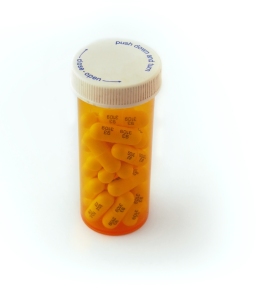It is well-known that overweight and obese individuals have higher blood pressure than those who are normal weight. There are many reasons why obesity causes an increase in blood pressure, but now it looks as if some of the drugs designed to combat high blood pressure may actually be contributing to problems with weight. Recent studies have led professionals to believe that blood pressure drugs, specifically older versions of beta-blockers, decrease the body’s ability to burn calories and fat.
Professionals have known that weight gain is a side effect of these drugs, but the details have been a little blurry. Recent studies have yielded surprising findings. When adults with high blood pressure who take beta-blockers were compared with adults with high blood pressure who do not take beta-blockers, the adults on the beta-blockers weighed 11-37 pounds more, had bigger waistlines, burned 30-50% fewer calories and fat after meals, and engaged in less physical activity than those who did not take beta-blockers.
It is not entirely understood how these drugs work to produce such undesirable effects, but they seem to decrease calorie expenditure leading to weight gain. Beta-blockers also slow the heart rate, explaining the decrease seen in physical activity levels. Having a decreased heart rate may cause people to tire more easily. And beta-blockers aren’t the only offenders; similar trends have been seen in people who take antidepressants, corticosteriods and certain diabetes medications.
If you are on older version of beta-blockers (the newer ones don’t seem to have as great a risk of weight gain), and you are concerned about weight gain, it may be a good idea to talk to you doctor about switching to a different drug.
It would also be best, for those who have high blood pressure and for those who have increased risk for high blood pressure, to make some lifestyle modifications. Here are some things you can do to control your high blood pressure naturally:
- Watch your alcohol intake. While there is evidence that some alcohol may actually help lower blood pressure, there is a fine line. Too much alcohol will increase your blood pressure. Binge drinking will also cause dangerous spikes in your blood pressure.
- Stop Smoking. Smoking increases blood pressure and greatly increases your risk of heart disease. Smoking decreases oxygen to the heart, increases heart rate, increases blood clotting and damages vessel cells. Your risk increases both with the number of cigarettes you smoke and how long you are a smoker.
- Cut out the caffeine. Caffeine causes dramatic spikes in blood pressure even for people who don’t have problems with their blood pressure.
- Go low sodium. The general recommendation for sodium is 2300 milligrams or less. For people with high blood pressure, you should aim for 1500 or less. To do this, don’t add salt to your foods, read labels for sodium content, opt for low-sodium options and avoid processed foods.
- Make sure you’re getting enough potassium. People with high blood pressure often have low levels of potassium. Having enough potassium may be protective against high blood pressure, and it may help reduce already high blood pressure. It is best to get potassium from foods rather than supplements. Some potassium-rich foods are: greens, sweet potatoes, bananas, tomatoes, grapefruit, yogurt, tuna, peas and lima beans.
- Get moving. Regular exercise is key in controlling high blood pressure. Aim for at least 30 minutes on most days of the week. If you can’t schedule 30 minutes at a time, break it down into 10 minute intervals. You will still get the benefits.
- Stress less. Stress causes spikes in blood pressure and may also cause long-term elevation. Look at what may be causing you stress in your everyday life and eliminate those stressors as much as possible. For things you cannot eliminate, come up with some strategies for coping with stress, such as deep breathing, meditation and exercise. It is also very important to put aside time each day to do something you enjoy.


